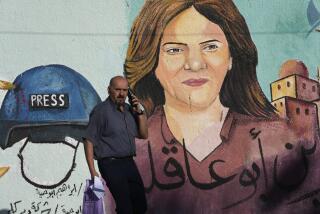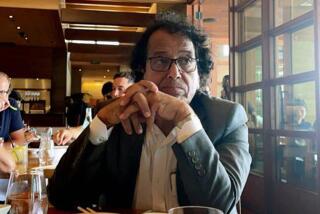Egyptian journalist gets suspended jail sentence for Sinai coverage
- Share via
CAIRO -- A military court has given a well-known Egyptian journalist working in the Sinai peninsula a six-month suspended jail sentence, state media reported Saturday, in a case that had drawn protests from media groups and rights activists.
The monthlong detention of Ahmed Abu Deraa, who worked for several local and international media outlets, stirred controversy over heavy-handed methods by the government, including use of military courts to try civilians.
The episode also pointed to sensitivities about an ongoing military offensive in the Sinai, where Egyptian forces last month launched a major push against Islamist groups that the government said had been allowed to flourish during the reign of now-deposed President Mohamed Morsi. Abu Deraa was accused of spreading lies about military operations.
In the wake of the popularly supported military coup against Morsi in July, the army has sought to further burnish the image of its leader, Gen. Abdel Fattah Sisi. The chief military spokesman has demanded that journalists be “cautious” in what they report about the army, and recently leaked tapes of meetings by senior military officials contained conversations about how to head off unfavorable coverage.
Abu Deraa, who was detained a month ago, is to be released soon, according to the official Ahram website, but no date was given.
The outcome of the journalist’s case was disclosed on the eve of huge military commemorations of the army’s initial successes in the 1973 war against Israel. Rallies and flyovers on Sunday are to mark the crossing of the Suez Canal by Egyptian troops that year and their push into the Israeli-held Sinai, gains that were reversed when Israeli forces rallied.
Backers of Morsi’s Muslim Brotherhood have pledged to stage counter-demonstrations Sunday during the army’s celebrations, raising the threat of violent clashes. The U.S. Embassy has urged American citizens to avoid areas where protests may take place.
On Friday, four people died in confrontations between Brotherhood supporters and security forces, the Health Ministry said. Authorities used tanks and barbed wire to seal off Tahrir Square, the scene of the massive protests that toppled President Hosni Mubarak in 2011. Morsi backers tried unsuccessfully to breach that security perimeter, setting off street battles close to the square.
[Updated at 9:55 a.m., Oct. 5: On Saturday, scattered clashes again broke out in the capital, with police firing tear gas to drive back demonstrators in the city center.]
ALSO:
Despite canceled trip, Obama ‘committed’ to U.S. pivot toward Asia
Iran nuclear talks: Congress is the elephant at the negotiating table
Suspected mastermind of Guatemala police massacre arrested in Mexico
More to Read
Sign up for Essential California
The most important California stories and recommendations in your inbox every morning.
You may occasionally receive promotional content from the Los Angeles Times.










